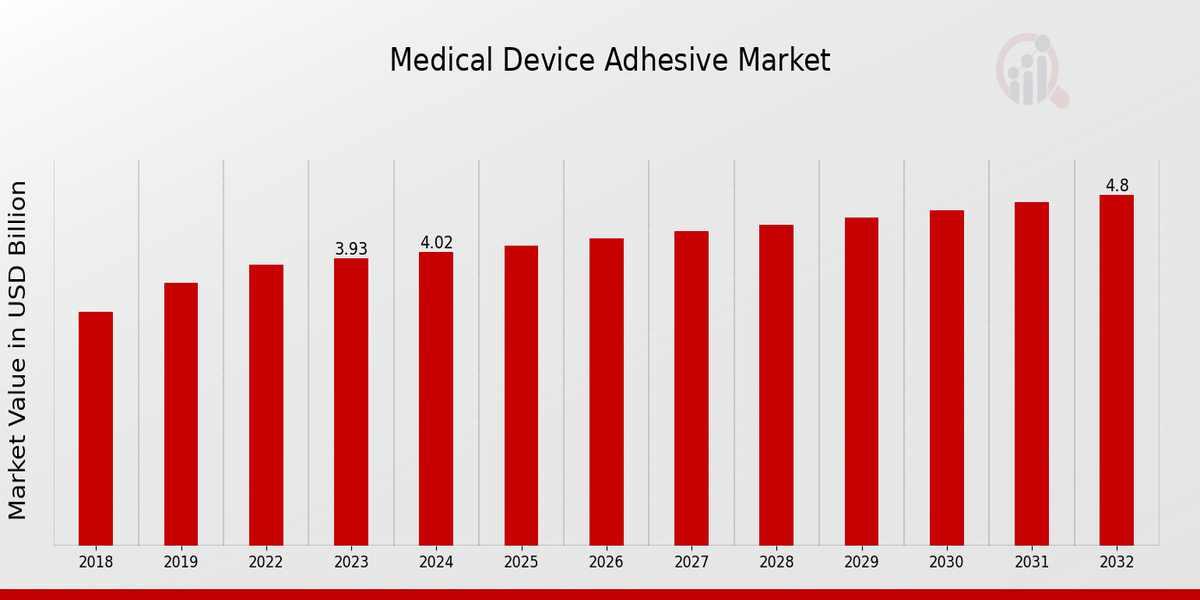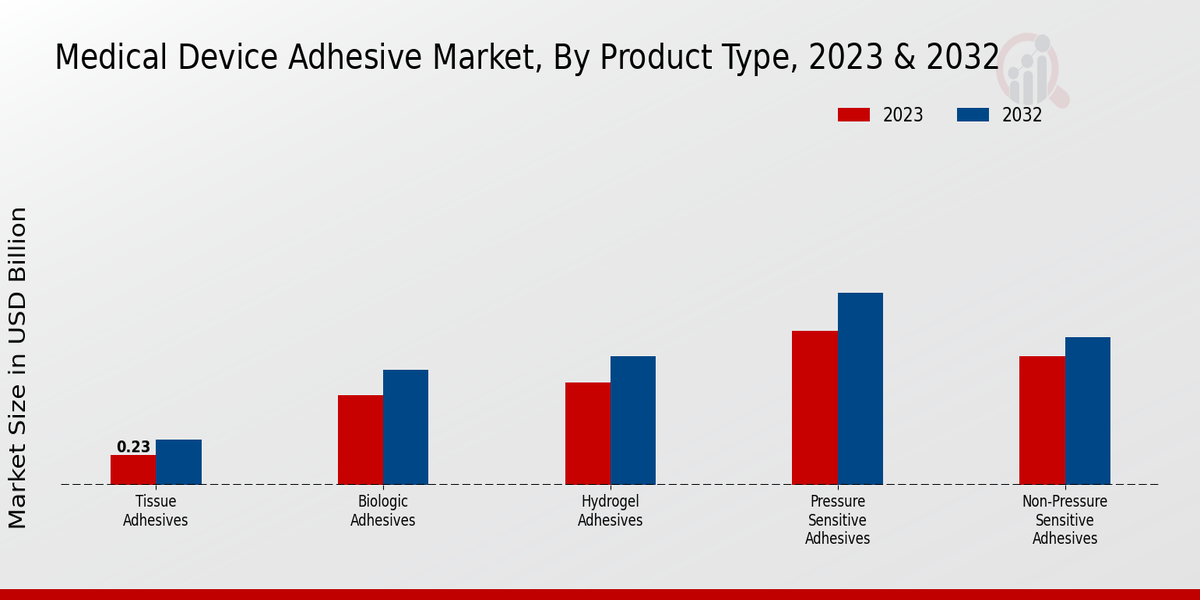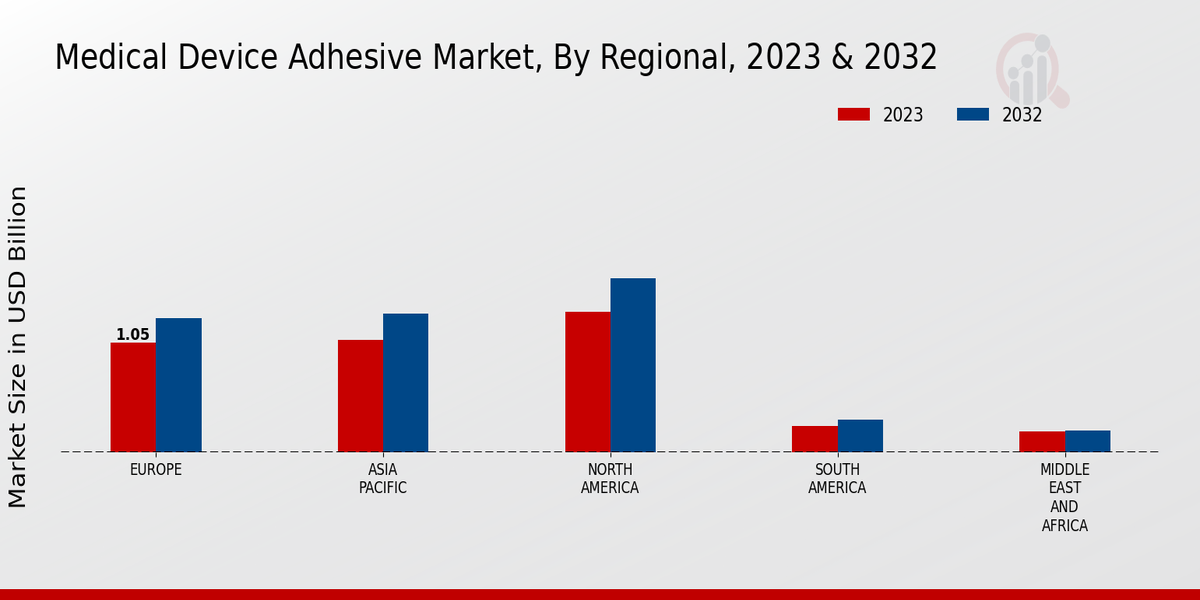Medical Device Adhesive Market Overview:
As per MRFR analysis, the Medical Device Adhesive Market Size was estimated at 9.85 (USD Billion) in 2023. The Medical Device Adhesive Market Industry is expected to grow from 10.98 (USD Billion) in 2024 to 24.42 (USD Billion) by 2032. The Market CAGR (growth rate) is expected to be around 9.28% during the forecast period (2024 - 2032).
Key Medical Device Adhesive Market Trends Highlighted
In the realm of healthcare, advancements in medical adhesives have transformed the landscape of medical device development. The global market for medical device adhesives is experiencing remarkable growth, driven by a surge in minimally invasive procedures and the development of novel adhesives with enhanced properties.
Key market drivers include the increasing demand for biocompatible and hypoallergenic materials, as well as the need for adhesives that can withstand harsh surgical environments and provide reliable bonding strength.
Opportunities lie in exploring adhesives for new applications, such as in wearable medical devices and implantable sensors. Recent trends indicate a growing focus on sustainable and environmentally friendly adhesives, as well as the integration of advanced technologies such as nanotechnology and plasma treatments to enhance performance.

Source: Primary Research, Secondary Research, MRFR Database and Analyst Review
Medical Device Adhesive Market Drivers
Technological Advancements in Medical Devices
The medical device industry is one of the technology-driven fields, as new technologies are constantly being developed, and new types of medical devices are being created. Notably, many of these technologies depend on the use of adhesives for their efficiency and safety.
At the same time, these technological advances pose new challenges, and adhesive manufacturers need to develop new solutions to meet the needs of medical device developers. With the advances in the types of medical devices used, new adhesive types need to be developed that would withstand the type of the human body's environment.
For example, the introduction of implantable medical devices has resulted in the need for adhesives that are biocompatible and can withstand the conditions of use in the human body. Also, with many medical devices becoming more miniature, there is an increased demand for small and durable adhesives.
Moreover, technological advances result in the need for some new types of adhesives. An example is the development of self-healing materials, which could allow the development of devices that would not need to be serviced frequently or at all.
Thus, one can conclude that the increasing technological dependence of the medical device industry is driving the demand for more innovative adhesives.
Increasing Prevalence of Chronic Diseases
The second driver that determines the growth of the medical device adhesive market is the increasing prevalence of chronic diseases. Many chronic diseases require treatment, and some of the treatments involve the use of medical devices.
Some of these devices are relatively simple, such as bandages, while others are complex and often implantable. All of these devices require adhesives in their proper functioning, hence the increasing prevalence of chronic diseases spurs the demand for medical devices and, consequently, the demand for adhesives used in their production.
Since the aging population ensures an increase in the prevalence of chronic diseases, this driver will most likely remain relevant in the years to come.
Growing Demand for Minimally Invasive Procedures
Minimally invasive procedures are kinds of surgical operations completed with relatively small incisions. This type of surgery is considered less risky and ensures faster recovery compared to traditional, or open, surgery.
The reduced scarring is one of the main advantages of minimally invasive operations, which is the reason behind its popularity. The situation stimulates the ongoing demand for new kinds of medical device adhesives suitable for minimally invasive surgery.
Medical device adhesives are an important part of minimally invasive procedures because they allow fastening catheters, endoscopes, and other instruments used during surgery. These adhesives need to be strong and long-lasting yet still biocompatible and removable.
The pace of growth of the market for medical adhesives, which has now entered a new stage of development, is likely to keep increasing, driven by the rising demand for minimally invasive surgeries.
Medical Device Adhesive Market Segment Insights:
Medical Device Adhesive Market Product Type Insights
In the Global Medical Device Adhesive Market, an in-depth look at the Product Type segmentation reveals significant insights into various adhesive categories that cater to medical applications.
Among these, Pressure Sensitive Adhesives led the charge with a valuation of 1.2 USD Billion in 2023, expected to rise to 1.5 USD Billion by 2032, indicating their majority holding in the market due to their ease of use and effectiveness in wound care and device assembly.
Non-Pressure Sensitive Adhesives followed with a valuation of 1.0 USD Billion in 2023, growing to 1.15 USD Billion by 2032, showcasing their significance, particularly in surgical applications, where enhanced bonding strength is essential.
Hydrogel Adhesives exhibited a notable growth potential, valued at 0.8 USD Billion in 2023 and projected to increase to 1.0 USD Billion, attributed to their biocompatibility and hydration properties, making them important in applications involving sensitive tissues.
Biologic Adhesives, valued at 0.7 USD Billion in 2023 and anticipated to grow to 0.9 USD Billion, were gaining traction in the market due to their natural origin and ability to facilitate healing processes, carving a niche for themselves in surgical procedures.
Tissue Adhesives, while smaller in market share at 0.23 USD Billion in 2023, are expected to rise to 0.35 USD Billion by 2032, underscoring their specialized use in minimizing suturing, thus streamlining surgical interventions.
As the Global Medical Device Adhesive Market continues to evolve, each adhesive type offers unique advantages and aligns with growing trends focusing on patient comfort, ease of application, and improved surgical outcomes.
The market dynamics are influenced by rising demand for safer and more efficient adhesives capable of meeting stringent regulatory requirements, paving the way for innovative advancements and opportunities across these Product Types in the industry.
Understanding these dynamics through the lens of Global Medical Device Adhesive Market revenue, segmentation data, and market statistics will provide greater insight into how these segments interact and compete within the broader landscape of medical device adhesives.

Source: Primary Research, Secondary Research, MRFR Database and Analyst Review
Medical Device Adhesive Market Application Insights
The Application segment encompasses several key areas including Wound Care, Surgical Closure, Transdermal Drug Delivery, Medical Device Fixation, and Tissue Engineering and Regeneration.
Wound Care holds significant importance as effective adhesives contribute to faster healing processes and improved patient outcomes. Surgical Closure continues to dominate due to the rising number of surgeries, necessitating reliable adhesive solutions.
Transdermal Drug Delivery is becoming increasingly pivotal, facilitating efficient drug administration through the skin and enhancing treatment efficacy. Medical Device Fixation plays a critical role in ensuring device stability and reliability, which is essential for patient safety.
Tissue Engineering and Regeneration is a growing area, highlighting advancements in medical technology to repair damaged tissues. As these applications expand, the Global Medical Device Adhesive Market revenue reflects the ongoing innovation and development, creating opportunities within the industry.
The market growth is supported by advancements in adhesive technologies, increasing healthcare investments, and a growing emphasis on personalized medicine, ensuring a robust future for this market segment.
Medical Device Adhesive Market Substrate Insights
Among various substrates, silicone and plastic are particularly pivotal due to their versatility and compatibility with a wide range of medical applications, facilitating both adhesion and flexibility. Skin substrates hold a majority share in applications like wound dressings and surgical adhesives, which are essential for patient safety and comfort.
Moreover, metal and textile materials are gaining traction for their utility in specialized devices and wearable technology, reflecting innovation within the industry.
The segmentation within the Global Medical Device Adhesive Market reflects a comprehensive understanding of each substrate's unique features, with significant opportunities for growth driven by advancements in adhesive technologies and increasing healthcare demands.
The ability to leverage various materials for medical device applications positions the market effectively against challenges like regulatory compliance and product safety, underscoring its potential for sustained expansion in the coming years.
Medical Device Adhesive Market Curing Mechanism Insights
The Curing Mechanism segment of the Global Medical Device Adhesive Market plays a critical role in the overall growth and functionality of medical devices.
The segment includes various mechanisms, such as Radiation Curing, UV Curing, Heat Curing, Moisture Curing, and Plasma Curing, each contributing differently to the adhesive properties and functionality in medical applications. Among these mechanisms, UV Curing stands out for its rapid curing capabilities, making it essential in scenarios requiring quick turnarounds.
Moisture Curing is also significant due to its versatility and effectiveness in humid environments, which is crucial for many medical devices. Furthermore, the sophisticated nature of Plasma Curing is increasingly recognized for its ability to enhance bonding strength, particularly in advanced materials.
As the Global Medical Device Adhesive Market continues to evolve, understanding the complexities within this segment becomes vital in harnessing growth opportunities while addressing challenges, such as stringent regulatory environments and material compatibility, which can impact overall market dynamics.
The Global Medical Device Adhesive Market data reflects a balanced interplay between these curing methods, driving innovation and enhancing product performance in the medical device industry.
Medical Device Adhesive Market Regional Insights
North America led with a valuation of 1.35 USD Billion, expected to reach 1.67 USD Billion by 2032, reflecting its majority holding and demand for advanced medical technologies.
Europe followed closely, valued at 1.05 USD Billion in 2023 and projected to grow to 1.29 USD Billion, showing significant innovation in adhesive applications. The Asia Pacific region accounted for a value of 1.08 USD Billion in 2023, which is expected to grow to 1.33 USD Billion, driven by increasing healthcare investments.
South America, although smaller, showed potential with a valuation of 0.25 USD Billion in 2023, expected to increase to 0.31 USD Billion, indicating a rising market interest. The Middle East and Africa held a value of 0.2 USD Billion, anticipated to reach 0.21 USD Billion, which reflects emerging market potential despite current limitations.
The Global Medical Device Adhesive Market data showed that North America's market dominance is primarily driven by high healthcare spending and innovation, while Europe demonstrates steady growth through regulatory support and an emphasis on product safety.

Source: Primary Research, Secondary Research, MRFR Database and Analyst Review
Medical Device Adhesive Market Key Players And Competitive Insights:
Major players in the Medical Device Adhesive Market are continuously competing to establish their stronghold across the regions. Leading Medical Device Adhesive Market players are dedicatedly focused on developing and introducing more advanced products to fulfill diverse customer requirements.
To achieve this, they are implementing different strategies, including merger and acquisition, partnership, geographical expansion, technological development, and product portfolio management. Continuous developments in the Medical Device Adhesive Market are likely to attract more new players and escalate competition in the Medical Device Adhesive Market.
Among the leading Medical Device Adhesive Market players, 3M Company is a globally recognized and prominent player. The company holds a dominant share in the global wound care market and is a prominent provider of medical tapes and dressings.
3M's continuous investment in research and development enables them to introduce innovative solutions, such as advanced adhesives and wound dressings, that meet the evolving needs of healthcare professionals and patients.
A notable competitor in the Medical Device Adhesive Market is Henkel AG & Co. KGaA, a leading provider of consumer and industrial adhesives. With its acquisition of reputable medical adhesive companies, Henkel has significantly expanded its presence in the medical device industry.
The company focuses on developing high-performance adhesives for surgical applications, wound care, and drug delivery devices. Henkel's strong emphasis on innovation has resulted in the development of specialized adhesives that offer enhanced biocompatibility and reduced risk of infection.
Key Companies in the Medical Device Adhesive Market Include:
- Henkel LOCTITE Corporation
- 3M
- Nitto Denko Corporation
- Bostik
- Avery Dennison Corporation
- Mactac
- Henkel AG Co. KGaA
- Tesa SE
- Sika AG
- Avery Products Corporation
- DowDuPont Inc.
- Scapa Group plc
- Lohmann Tapes GmbH Co. KG
- Arkema SA
- B. Fuller Company
Medical Device Adhesive Market Developments
The rising demand for minimally invasive surgeries, the increasing prevalence of chronic diseases, and technological advancements in medical adhesives are driving market growth. Key industry developments include the launch of new products with enhanced properties, strategic acquisitions, and collaborations among market players.
Recent news highlights include the acquisition of Adhezion Biomedical by 3M in 2023, strengthening 3M's position in the surgical and wound care markets. Furthermore, the development of biocompatible and biodegradable adhesives holds promising opportunities for the future.
Medical Device Adhesive Market Segmentation Insights
- Medical Device Adhesive Market Product Type Outlook
- Pressure Sensitive Adhesives
- Non-Pressure Sensitive Adhesives
- Hydrogel Adhesives
- Biologic Adhesives
- Tissue Adhesives
- Medical Device Adhesive Market Application Outlook
- Wound Care
- Surgical Closure
- Transdermal Drug Delivery
- Medical Device Fixation
- Tissue Engineering and Regeneration
- Medical Device Adhesive Market Substrate Outlook
- Skin
- Metal
- Plastic
- Silicone
- Textile
- Medical Device Adhesive Market Curing Mechanism Outlook
- Radiation Curing
- UV Curing
- Heat Curing
- Moisture Curing
- Plasma Curing
- Medical Device Adhesive Market Regional Outlook
- North America
- Europe
- South America
- Asia Pacific
- Middle East and Africa
|
Report Attribute/Metric
|
Details
|
|
Market Size 2023
|
9.85(USD Billion)
|
|
Market Size 2024
|
10.98(USD Billion)
|
|
Market Size 2032
|
24.42 (USD Billion)
|
|
Compound Annual Growth Rate (CAGR)
|
9.28% (2024 - 2032)
|
|
Report Coverage
|
Revenue Forecast, Competitive Landscape, Growth Factors, and Trends
|
|
Base Year
|
2023
|
|
Market Forecast Period
|
2024 - 2032
|
|
Historical Data
|
2019 - 2023
|
|
Market Forecast Units
|
USD Billion
|
|
Key Companies Profiled
|
Henkel LOCTITE Corporation, 3M, Nitto Denko Corporation, Bostik, Avery Dennison Corporation, Mactac, Henkel AG Co. KGaA, Tesa SE, Sika AG, Avery Products Corporation, DowDuPont Inc., Scapa Group plc, Lohmann Tapes GmbH Co. KG, Arkema SA, H.B. Fuller Company
|
|
Segments Covered
|
Product Type, Application, Substrate, Curing Mechanism, Regional
|
|
Key Market Opportunities
|
Growing demand for minimally invasive procedures Technological advancements in biocompatible adhesives Rising prevalence of chronic diseases Increasing geriatric population Expansion of emerging markets
|
|
Key Market Dynamics
|
Growing demand for minimally invasive surgeries Technological advancements in adhesive materials Increasing prevalence of chronic diseases Government regulations and standards Rising demand from emerging markets
|
|
Countries Covered
|
North America, Europe, APAC, South America, MEA
|
Frequently Asked Questions (FAQ) :
The expected market size of the Medical Device Adhesive Market in 2032 is projected to be 24.42 USD Billion.
The projected CAGR for the Medical Device Adhesive Market from 2024 to 2032 is 9.28%.
North America holds the largest market share in the Medical Device Adhesive Market, valued at 10.2 USD Billion in 2023.
The market for Acrylic Adhesives in the Medical Device Adhesive Market is expected to grow from 5.5 USD Billion in 2023 to 8.5 USD Billion by 2032.
Key players in the Medical Device Adhesive Market include Dow, Scapa, Nitto Denko, Bostik, and Johnson
The anticipated market value for Silicone Adhesives in the Medical Device Adhesive Market is expected to reach 6.0 USD Billion by 2032.
The main opportunities driving growth in the Medical Device Adhesive Market include technological advancements and the rising demand for durable medical equipment.
The market size for Cyanoacrylate Adhesives in the Medical Device Adhesive Market is expected to reach 9.0 USD Billion by 2032.
The expected market growth rate for the South American region in the Medical Device Adhesive Market is anticipated to increase from 1.5 USD Billion in 2023 to 2.5 USD Billion by 2032.

















